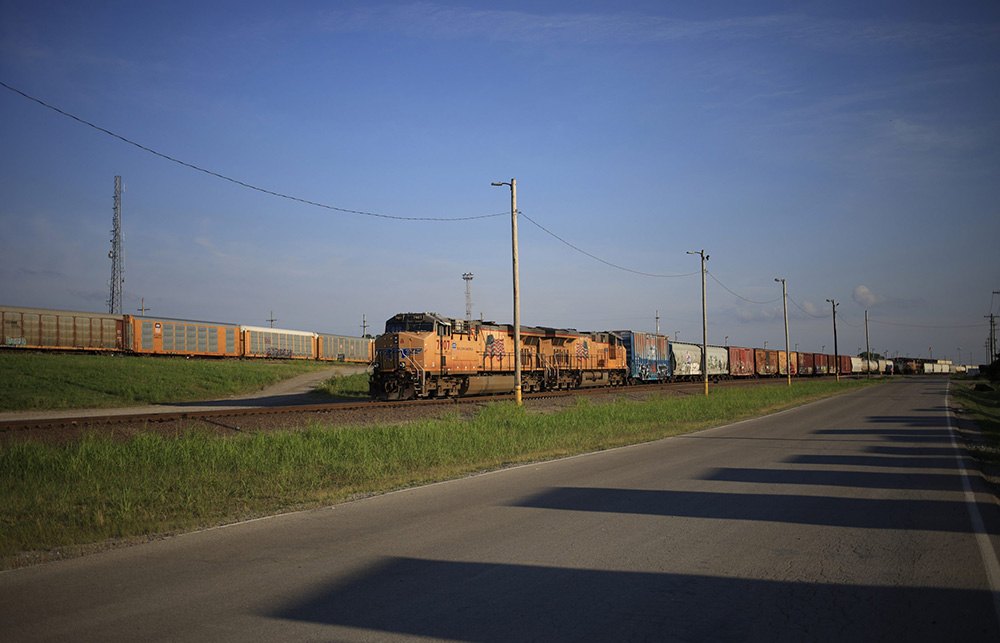
本月早些時(shí)候,,艾克?布蘭農(nóng)和邁克爾?戈?duì)柭凇敦?cái)富》雜志洋洋灑灑地發(fā)表了一篇評(píng)論文章,試圖駁斥我對(duì)鐵路貨運(yùn)精確調(diào)度系統(tǒng)(PSR)的擔(dān)憂,。請(qǐng)?jiān)试S我把話說(shuō)清楚,。
我在美國(guó)眾議院交通和基礎(chǔ)設(shè)施委員會(huì)工作了34年,歷經(jīng)7屆不同的聯(lián)邦政府(包括民主黨和共和黨政府),。作為一位公共政策制定者,,我深知貨物運(yùn)輸對(duì)美國(guó)經(jīng)濟(jì)的極端重要性。高效,、可靠和安全的貨運(yùn)能力使我們?cè)谌蚪?jīng)濟(jì)中更具競(jìng)爭(zhēng)力。
運(yùn)輸業(yè)的許多利益相關(guān)者都認(rèn)為,,鐵路貨運(yùn)對(duì)減少美國(guó)的碳排放至關(guān)重要,。運(yùn)輸業(yè)目前是美國(guó)溫室氣體排放最高的行業(yè),將更多的貨運(yùn)從卡車轉(zhuǎn)向鐵路可以顯著減少這些排放,。據(jù)鐵路貨運(yùn)行業(yè)估計(jì),,如果將至少行駛750英里的卡車運(yùn)輸中的25%改為鐵路運(yùn)輸,每年的溫室氣體排放量將減少約1310萬(wàn)噸,。
但PSR系統(tǒng)并不是一種花里胡哨,,旨在增加貨運(yùn)量、改善運(yùn)營(yíng)和減少排放的優(yōu)化策略,。相反,,這是華爾街為提高短期利潤(rùn)而推行的一種商業(yè)策略。華爾街的投資者已經(jīng)證明,,他們并不關(guān)心他們想從中獲取財(cái)富的行業(yè)的長(zhǎng)期健康狀況,。同樣,他們也不關(guān)心是否有一個(gè)高效,、可靠和安全的貨運(yùn)服務(wù)來(lái)推動(dòng)美國(guó)經(jīng)濟(jì),。
而且他們對(duì)此并不隱瞞,。投資者電話會(huì)議表明,目光短淺的華爾街投資者只關(guān)注短期利潤(rùn),,竭力要求鐵路公司通過削減成本和增加收入來(lái)提高季度利潤(rùn),。這樣做所犧牲的,是卓越的鐵路貨運(yùn)服務(wù)和行業(yè)的長(zhǎng)期健康,。
在我供職的委員會(huì)和地面運(yùn)輸委員會(huì)(STB)召開的公開聆訊會(huì)上,,在一些公開信中,許多托運(yùn)人詳細(xì)闡述了PSR系統(tǒng)對(duì)貨運(yùn)的影響,。這些影響包括對(duì)運(yùn)營(yíng)計(jì)劃和服務(wù)時(shí)間表的破壞性改變,;服務(wù)質(zhì)量退化,比如由于機(jī)車動(dòng)力不足和缺乏工作人員而造成的延誤,;以及不合理的收費(fèi),,比如隨意增加滯期費(fèi)和附加費(fèi)。一些托運(yùn)人甚至因此而被迫使用更多的卡車運(yùn)輸,。
PSR系統(tǒng)的諸多影響之一是列車長(zhǎng)度的無(wú)節(jié)制增長(zhǎng),。美國(guó)政府問責(zé)署(GAO)的一項(xiàng)研究發(fā)現(xiàn),2008年至2017年,,兩家Ⅰ級(jí)鐵路公司(這個(gè)級(jí)別包括美國(guó)7家最大的鐵路公司)的列車長(zhǎng)度增加了25%,。每家Ⅰ級(jí)鐵路公司的官員都表示,他們運(yùn)營(yíng)的列車越來(lái)越長(zhǎng),,其中一些延伸數(shù)英里,。在投資者電話會(huì)議上,鐵路貨運(yùn)公司不停地吹噓其列車長(zhǎng)度每年都在增長(zhǎng),。
聯(lián)邦鐵路管理局(FRA)仍在研究這些長(zhǎng)列車的安全影響,。在投資者獲得利益的同時(shí),普通民眾卻在經(jīng)歷種種弊端,。全美城市聯(lián)盟(National League of Cities),,以及州和地方官員紛紛向美國(guó)政府問責(zé)署抱怨,過去只是幾分鐘的煩惱,,現(xiàn)在卻會(huì)導(dǎo)致整個(gè)社區(qū)的交通堵塞和緊急服務(wù)延誤,。
而且情況越來(lái)越糟。根據(jù)我在多場(chǎng)聽證會(huì)上聽到的證詞,,這些更長(zhǎng)的列車更加頻繁地堵塞道口,,堵塞的時(shí)間也更長(zhǎng)。華爾街可能不在乎,,但普通民眾很在意,。
最后要說(shuō)的是,沒有一支強(qiáng)大的勞動(dòng)力隊(duì)伍,,鐵路貨運(yùn)就無(wú)法運(yùn)轉(zhuǎn),。我們不要忘記,,在新冠肺炎疫情襲來(lái)之前,從2015年到2019年,,鐵路貨運(yùn)行業(yè)將其勞動(dòng)力平均削減了17%以上,。難怪地面運(yùn)輸委員會(huì)主席馬丁·奧伯曼一直在搜尋信息,試圖搞清楚托運(yùn)人近期的抱怨是否跟如此大規(guī)模的裁員有關(guān),。與華爾街的百萬(wàn)富翁和億萬(wàn)富翁相比,,我更關(guān)心中產(chǎn)階級(jí)工人的福祉和安全。這或許是我的不對(duì),。但只有背負(fù)這種負(fù)擔(dān),,我才會(huì)睡得更安穩(wěn)。
我的目標(biāo)一直是,,現(xiàn)在仍然是培育一個(gè)健康的鐵路貨運(yùn)市場(chǎng),,以推動(dòng)整體經(jīng)濟(jì)并減少碳排放。華爾街的目標(biāo)是變得更富有——不管我們的經(jīng)濟(jì),、環(huán)境,、運(yùn)輸系統(tǒng)或廣大勞動(dòng)者由此遭受什么影響。(財(cái)富中文網(wǎng))
譯者:任文科
本月早些時(shí)候,,艾克?布蘭農(nóng)和邁克爾?戈?duì)柭凇敦?cái)富》雜志洋洋灑灑地發(fā)表了一篇評(píng)論文章,,試圖駁斥我對(duì)鐵路貨運(yùn)精確調(diào)度系統(tǒng)(PSR)的擔(dān)憂。請(qǐng)?jiān)试S我把話說(shuō)清楚,。
我在美國(guó)眾議院交通和基礎(chǔ)設(shè)施委員會(huì)工作了34年,,歷經(jīng)7屆不同的聯(lián)邦政府(包括民主黨和共和黨政府)。作為一位公共政策制定者,,我深知貨物運(yùn)輸對(duì)美國(guó)經(jīng)濟(jì)的極端重要性,。高效、可靠和安全的貨運(yùn)能力使我們?cè)谌蚪?jīng)濟(jì)中更具競(jìng)爭(zhēng)力,。
運(yùn)輸業(yè)的許多利益相關(guān)者都認(rèn)為,鐵路貨運(yùn)對(duì)減少美國(guó)的碳排放至關(guān)重要,。運(yùn)輸業(yè)目前是美國(guó)溫室氣體排放最高的行業(yè),,將更多的貨運(yùn)從卡車轉(zhuǎn)向鐵路可以顯著減少這些排放。據(jù)鐵路貨運(yùn)行業(yè)估計(jì),,如果將至少行駛750英里的卡車運(yùn)輸中的25%改為鐵路運(yùn)輸,,每年的溫室氣體排放量將減少約1310萬(wàn)噸。
但PSR系統(tǒng)并不是一種花里胡哨,,旨在增加貨運(yùn)量,、改善運(yùn)營(yíng)和減少排放的優(yōu)化策略。相反,,這是華爾街為提高短期利潤(rùn)而推行的一種商業(yè)策略,。華爾街的投資者已經(jīng)證明,,他們并不關(guān)心他們想從中獲取財(cái)富的行業(yè)的長(zhǎng)期健康狀況。同樣,,他們也不關(guān)心是否有一個(gè)高效,、可靠和安全的貨運(yùn)服務(wù)來(lái)推動(dòng)美國(guó)經(jīng)濟(jì)。
而且他們對(duì)此并不隱瞞,。投資者電話會(huì)議表明,,目光短淺的華爾街投資者只關(guān)注短期利潤(rùn),竭力要求鐵路公司通過削減成本和增加收入來(lái)提高季度利潤(rùn),。這樣做所犧牲的,,是卓越的鐵路貨運(yùn)服務(wù)和行業(yè)的長(zhǎng)期健康。
在我供職的委員會(huì)和地面運(yùn)輸委員會(huì)(STB)召開的公開聆訊會(huì)上,,在一些公開信中,,許多托運(yùn)人詳細(xì)闡述了PSR系統(tǒng)對(duì)貨運(yùn)的影響。這些影響包括對(duì)運(yùn)營(yíng)計(jì)劃和服務(wù)時(shí)間表的破壞性改變,;服務(wù)質(zhì)量退化,,比如由于機(jī)車動(dòng)力不足和缺乏工作人員而造成的延誤;以及不合理的收費(fèi),,比如隨意增加滯期費(fèi)和附加費(fèi),。一些托運(yùn)人甚至因此而被迫使用更多的卡車運(yùn)輸。
PSR系統(tǒng)的諸多影響之一是列車長(zhǎng)度的無(wú)節(jié)制增長(zhǎng),。美國(guó)政府問責(zé)署(GAO)的一項(xiàng)研究發(fā)現(xiàn),,2008年至2017年,兩家Ⅰ級(jí)鐵路公司(這個(gè)級(jí)別包括美國(guó)7家最大的鐵路公司)的列車長(zhǎng)度增加了25%,。每家Ⅰ級(jí)鐵路公司的官員都表示,,他們運(yùn)營(yíng)的列車越來(lái)越長(zhǎng),其中一些延伸數(shù)英里,。在投資者電話會(huì)議上,,鐵路貨運(yùn)公司不停地吹噓其列車長(zhǎng)度每年都在增長(zhǎng)。
聯(lián)邦鐵路管理局(FRA)仍在研究這些長(zhǎng)列車的安全影響,。在投資者獲得利益的同時(shí),,普通民眾卻在經(jīng)歷種種弊端。全美城市聯(lián)盟(National League of Cities),,以及州和地方官員紛紛向美國(guó)政府問責(zé)署抱怨,,過去只是幾分鐘的煩惱,現(xiàn)在卻會(huì)導(dǎo)致整個(gè)社區(qū)的交通堵塞和緊急服務(wù)延誤,。
而且情況越來(lái)越糟,。根據(jù)我在多場(chǎng)聽證會(huì)上聽到的證詞,這些更長(zhǎng)的列車更加頻繁地堵塞道口,堵塞的時(shí)間也更長(zhǎng),。華爾街可能不在乎,,但普通民眾很在意。
最后要說(shuō)的是,,沒有一支強(qiáng)大的勞動(dòng)力隊(duì)伍,,鐵路貨運(yùn)就無(wú)法運(yùn)轉(zhuǎn)。我們不要忘記,,在新冠肺炎疫情襲來(lái)之前,,從2015年到2019年,鐵路貨運(yùn)行業(yè)將其勞動(dòng)力平均削減了17%以上,。難怪地面運(yùn)輸委員會(huì)主席馬丁·奧伯曼一直在搜尋信息,,試圖搞清楚托運(yùn)人近期的抱怨是否跟如此大規(guī)模的裁員有關(guān)。與華爾街的百萬(wàn)富翁和億萬(wàn)富翁相比,,我更關(guān)心中產(chǎn)階級(jí)工人的福祉和安全,。這或許是我的不對(duì)。但只有背負(fù)這種負(fù)擔(dān),,我才會(huì)睡得更安穩(wěn),。
我的目標(biāo)一直是,現(xiàn)在仍然是培育一個(gè)健康的鐵路貨運(yùn)市場(chǎng),,以推動(dòng)整體經(jīng)濟(jì)并減少碳排放,。華爾街的目標(biāo)是變得更富有——不管我們的經(jīng)濟(jì)、環(huán)境,、運(yùn)輸系統(tǒng)或廣大勞動(dòng)者由此遭受什么影響,。(財(cái)富中文網(wǎng))
譯者:任文科
In a commentary published in?Fortune earlier this month, Ike Brannon and Michael F. Gorman took great liberties in trying to debunk my concerns with precision scheduled railroading (PSR). Please allow me to set the record straight.
I have served on the U.S. House Committee on Transportation and Infrastructure for 34 years, crafting public policy through seven different presidential administrations, both Democratic and Republican. Freight transportation is critical to our economy. The ability to efficiently, reliably, and safely deliver freight makes us more competitive in the global economy.
And many?transportation stakeholders agree that freight rail is critical to reducing our nation’s carbon emissions. The transportation sector is now the highest emitter of greenhouse gases in the country and shifting more freight from trucks to rail could significantly reduce these emissions. Freight railroads estimate that if 25% of the truck traffic moving at least 750 miles went by rail instead, annual greenhouse gas emissions would fall by approximately 13.1 million tons.
But PSR is not some fancy optimization strategy to increase freight volume or improve operations and reduce emissions; rather, it is a business strategy promoted by Wall Street to boost short-term profits. Wall Street investors have proven they don’t care about the long-term health of the industries from which they seek to extract wealth. Similarly, they don’t care about ensuring an efficient, reliable, and safe freight service that drives the U.S. economy.
And they’re not hiding it. Investor calls demonstrate that Wall Street investors’ myopic focus on short-term profits demands that railroads boost quarterly profits by cutting costs and increasing revenues. In doing so, great freight rail service and the long-term health of the industry is sacrificed.
At public proceedings before my committee and the Surface Transportation Board (STB), and in public letters, an?array of shippers have detailed the effects PSR has had on freight movement. These include disruptive changes to operating plans and service schedules; degradation of service, such as delays due to insufficient locomotive power and lack of crews; and unreasonable charges, such as increases in demurrage and accessorial fees. Some shippers have even been forced to use more trucking as a result.
One of the many impacts of PSR is the uncontrolled growth in train lengths. A U.S. Government Accountability Office (GAO) study found that between 2008 and 2017, train length grew by 25% for two Class I railroads (which comprise the seven largest railroads in the U.S.), and officials from each Class I stated they operate longer trains, including some that extend for several miles. Freight railroad investor calls continue to boast annual train length increases every year.
The Federal Railroad Administration (FRA) is still studying the safety impacts of these long trains. While investors reap the benefits, the general public experiences the drawbacks. What was once a few-minute annoyance now can cause community-wide traffic jams and emergency services delays—concerns expressed to the GAO by the National League of Cities and state and local officials.
And it’s getting worse. In multiple committee hearings, I have heard testimony that these longer trains are more frequently blocking crossings for longer amounts of time. Wall Street may not care, but Main Street does.
And finally, freight rail does not function without a strong workforce. Let’s not forget that prior to COVID-19, from 2015 to 2019, the freight railroad industry slashed the average size of its workforce by over 17%. It’s little wonder that STB Chairman Martin Oberman has sought information about how such a reduction may be related to or contributed to recent shipper complaints. I may be guilty of caring about middle-class workers and their safety more than Wall Street millionaires and billionaires, but I sleep just fine bearing that burden.
My goal has been and remains to foster a healthy freight rail market that boosts the overall economy and reduces carbon emissions. Wall Street’s goal is to get wealthier—no matter the impact on our economy, environment, transportation system, or workforce.






